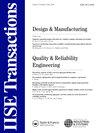Modeling User Choice Behavior under Data Corruption: Robust Learning of the Latent Decision Threshold Model
IF 2
3区 工程技术
Q3 ENGINEERING, INDUSTRIAL
引用次数: 0
Abstract
AbstractRecent years have witnessed the emergence of many new mobile Apps and user-centered systems that interact with users by offering choices with rewards. These applications have been promising to address challenging societal problems such as congestion in transportation and behavior changes for healthier lifestyles. Considerable research efforts have been devoted to model the user behaviors in these new applications. However, as real-world user data is often prone to data corruptions, the success of these models hinges on a robust learning method. Building on the recently proposed Latent Decision Threshold (LDT) model, this paper shows that, among the existing robust learning frameworks, the L0 norm based framework can outperform other state-of-the-art methods in terms of prediction accuracy and model estimation. And based on the L0 norm framework, we further develop a user screening algorithm to identify potential bad actors.Keywords: Choice Behavior ModelingLatent Decision Threshold ModelRobust learningData CorruptionBad Actor DetectionDisclaimerAs a service to authors and researchers we are providing this version of an accepted manuscript (AM). Copyediting, typesetting, and review of the resulting proofs will be undertaken on this manuscript before final publication of the Version of Record (VoR). During production and pre-press, errors may be discovered which could affect the content, and all legal disclaimers that apply to the journal relate to these versions also.数据损坏下的用户选择行为建模:潜在决策阈值模型的鲁棒学习
摘要近年来出现了许多新的移动应用程序和以用户为中心的系统,它们通过提供带有奖励的选择与用户进行交互。这些应用有望解决具有挑战性的社会问题,如交通拥堵和健康生活方式的行为改变。大量的研究工作已经投入到这些新应用程序中的用户行为建模中。然而,由于现实世界的用户数据往往容易出现数据损坏,因此这些模型的成功取决于健壮的学习方法。基于最近提出的潜在决策阈值(LDT)模型,本文表明,在现有的鲁棒学习框架中,基于L0范数的框架在预测精度和模型估计方面优于其他最先进的方法。在L0规范框架的基础上,我们进一步开发了一种用户筛选算法来识别潜在的不良行为者。关键词:选择行为建模潜在决策阈值模型鲁棒学习数据腐败不良行为检测免责声明作为对作者和研究人员的服务,我们提供此版本的已接受手稿(AM)。在最终出版版本记录(VoR)之前,将对该手稿进行编辑、排版和审查。在制作和印前,可能会发现可能影响内容的错误,所有适用于期刊的法律免责声明也与这些版本有关。
本文章由计算机程序翻译,如有差异,请以英文原文为准。
求助全文
约1分钟内获得全文
求助全文
来源期刊

IISE Transactions
Engineering-Industrial and Manufacturing Engineering
CiteScore
5.70
自引率
7.70%
发文量
93
期刊介绍:
IISE Transactions is currently abstracted/indexed in the following services: CSA/ASCE Civil Engineering Abstracts; CSA-Computer & Information Systems Abstracts; CSA-Corrosion Abstracts; CSA-Electronics & Communications Abstracts; CSA-Engineered Materials Abstracts; CSA-Materials Research Database with METADEX; CSA-Mechanical & Transportation Engineering Abstracts; CSA-Solid State & Superconductivity Abstracts; INSPEC Information Services and Science Citation Index.
Institute of Industrial and Systems Engineers and our publisher Taylor & Francis make every effort to ensure the accuracy of all the information (the "Content") contained in our publications. However, Institute of Industrial and Systems Engineers and our publisher Taylor & Francis, our agents, and our licensors make no representations or warranties whatsoever as to the accuracy, completeness, or suitability for any purpose of the Content. Any opinions and views expressed in this publication are the opinions and views of the authors, and are not the views of or endorsed by Institute of Industrial and Systems Engineers and our publisher Taylor & Francis. The accuracy of the Content should not be relied upon and should be independently verified with primary sources of information. Institute of Industrial and Systems Engineers and our publisher Taylor & Francis shall not be liable for any losses, actions, claims, proceedings, demands, costs, expenses, damages, and other liabilities whatsoever or howsoever caused arising directly or indirectly in connection with, in relation to, or arising out of the use of the Content. Terms & Conditions of access and use can be found at http://www.tandfonline.com/page/terms-and-conditions .
 求助内容:
求助内容: 应助结果提醒方式:
应助结果提醒方式:


